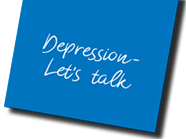What can a pharmacist do?
Depending on the situation of the patient, the pharmacist can be a facilitator for him or her to access care. If the patient is approaching you before obtaining a clinical diagnosis, you could explore their current situation and get an impression of the depressive symptoms they might have. If necessary, you can recommend that they seek an appointment with a general practitioner or a psychiatrist for a clinical assessment.
As a pharmacist, you are not directly involved in depression treatment but you can take some time to talk to the patient and be prepared to answer questions that they might have. This will likely encourage the patient to seek or continue the treatment they need.
Most importantly, people will ask your advice on pharmacotherapy. Frequently, people have inaccurate ideas about medication. They may be afraid of antidepressant side effects, believe that antidepressants will change their personality, or worry that they will become dependent on antidepressants. These are all myths that as a pharmacist you can help to dispel. Conversely, very frequently, people may think that benzodiazepines have fewer secondary effects and have lower risk of abuse than they actually do. You can help by raising awareness of the secondary effects and risks associated with benzodiazepines.



